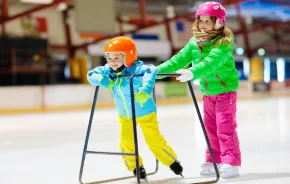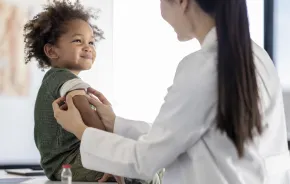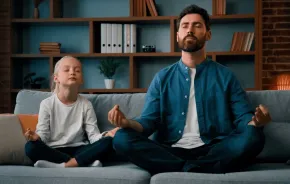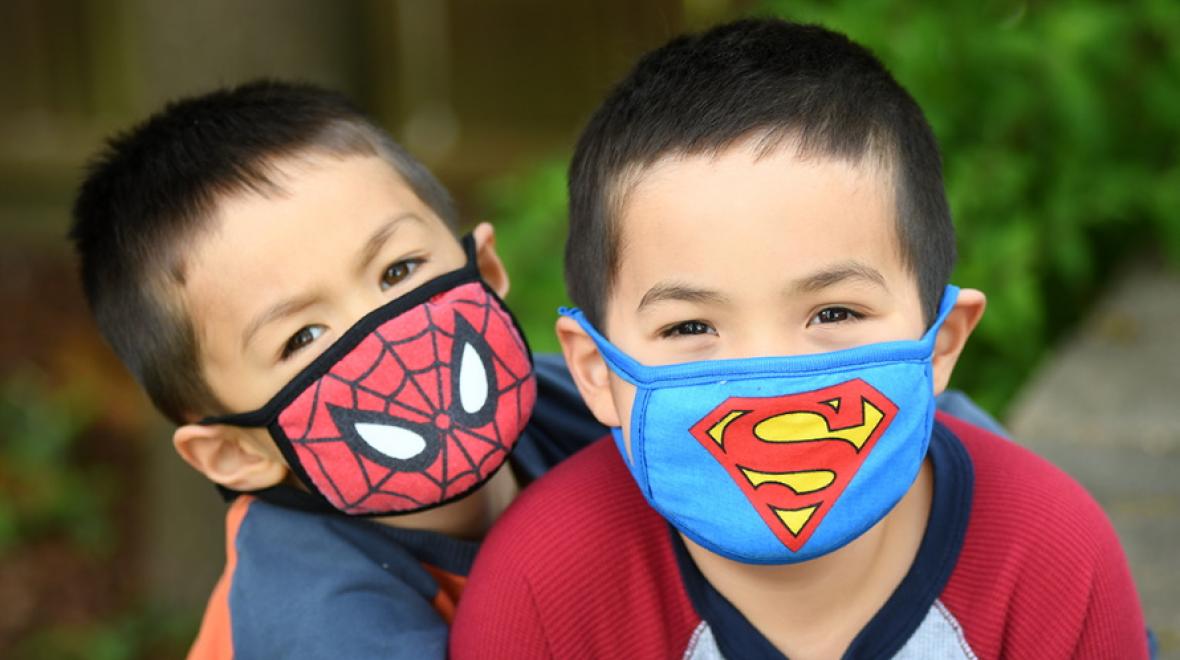
Photo:
The author's children wearing masks. Credit: JiaYing Grygiel
After weeks of insisting that no, the general public should not wear face masks, the CDC did a 180 in early April that set off a national scramble for elastic. As of today, May 18, Public Health — Seattle & King County is urging everyone to wear face coverings in most public places to slow the spread of COVID-19.
Two important face-mask rules for parents to note:
- Kids under age 2 should never wear a face mask.
- Kids ages 2–12 should wear face masks only under an adult’s supervision.
Why should kids wear face masks? “Kids are more likely to have a mild illness, so you may not know that they’re sick and spreading the virus,” said Public Health spokeswoman Kate Cole. “In addition, it’s harder for kids to be isolated when sick in order to limit spread to others.”
You can make a makeshift face mask out of a bandana and hair elastics, or cut a no-sew version from a T-shirt (check out instructions from the CDC). But in our experience, these don’t stay put very well, especially not on an active kid. Many people with sewing machines are making homemade face masks; ask around and see if you can find a local person with sewing skills who is selling masks. We’ve got a list of sites where you can order masks from below, though many places are back-ordered.
Once you get a hold of face masks for the kids, the hard part is convincing kids to wear them and to not touch their faces (okay, that’s hard for adults, too).
How to convince your kids to wear a face mask:
- Tell the kids they are ninjas!
- Get face masks in cute patterns that match their special interests. Trucks? Unicorns? Find something they love.
- Make a little matching mask for their favorite stuffy or doll so your kids can have a role model: “Look! Teddy’s wearing one. So should you.”
- Do you have a little fashionista? Face masks are the newest accessory. Try a face mask with a matching headband.
- Try reasoning with them? Explain that wearing a face mask will help keep them from getting other people sick. The lady you pass in the grocery store might be someone’s grandmother, and you want to keep her safe.
- Practice wearing a face mask at home, even if it’s just for a few minutes. This is especially important if your kids are headed to a place where a face mask is required, like on an airplane flight.
What to look for when buying a mask
When you’re ordering online, look for washable masks made from multiple layers of tightly-woven fabric. You might have to try a few styles to see what’s most comfortable for your kids. Some designs come with a wire sewn inside that can be shaped to fit your child’s face. Elastic loops that go over the ears are the easiest to put on, but it will strain your ears. Try face masks that tie behind their heads for sensory-sensitive kids.
Remember, leave surgical masks and N95 masks for healthcare workers.
Seattle-area companies selling masks for kids
Little Hands Creations owner Chelsea Cook is keeping her teachers employed by making masks. They offer shaped, pleated and polypropylene versions ($12–$18). They're offering free, no-contact pickup from their Fremont studio or doorstep delivery.
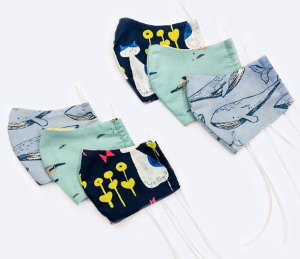
SwaddleDesigns, founded by registered nurse Lynette Damir, switched its baby blanket factory to making cotton face masks ($9.99). Damir pivoted her small business after hearing about the dire need in hospitals from her niece and cousin, who are both ICU nurses.
When you purchase from the non-profit Refugee Artisan Initiative, you’re supporting living wages for refugee and immigrant women in Seattle. Cotton masks ($40 for a 5-pack) are available in adult and kids’ sizes. You can also buy a mask-making kit (supplies for making 10 masks costs $15).
Local seller Splash Fabric will donate a mask to someone in need for every mask you buy. The kids’ masks ($10) are double-layered soft cotton with Lycra ear loops. Mask donations go to low-income families, kids, essential workers, caregivers, teachers, nurses and health care clinics.
Local company Tokki is also donating a mask to a frontline worker for every mask purchased. Tokki offers masks sized for kids ages 3–6 and 7–12, made of tight-weave 100-percent cotton with adjustable elastic ties ($32 for a 2-pack). CEO Jane Park (who also founded Julep) was born in Korea, and “tokki” is Korean for “rabbit.”
National companies selling masks for kids
Cubcoats face masks cost $12.99 for a 2-pack. The kids’ masks match stuffies that turn into hoodies.
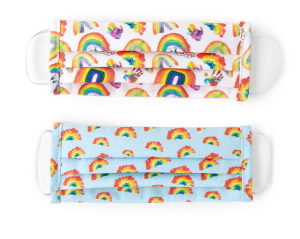
Jananuu offers reusable antimicrobial finished kids’ face masks, a 5-pack costs $25.
Alex + Nova sells organic cotton reusable face masks for $20 each.
Masqd kids' face masks cost $14.99–$24.99.
Athleta offers non-medical kids' face masks; a 5-pack costs $30. (Back-ordered through June 20.)
Uncommon Goods children's rainbow face coverings cost $25 for a 2-pack. All of the profits from these kid-designed masks go to New York City’s public hospitals.
Disney is selling cloth face masks; a 4-pack costs $19.99. Kid-friendly patterns include Star Wars, Marvel, Pixar, princesses and Mickey. You can pre-order now, but they won’t be available until July 15.
Old Navy is selling triple layer cloth masks for kids; a 5-pack costs $12.50. These are the most economical ones we’ve found, but they're currently sold out.









